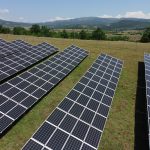Yesterday the German plaintiffs of the People’s Climate Case, Maike and Michael Recktenwald won the ZEIT WISSEN in the category of ‘Action’ for taking the EU to court over its insufficient 2030 climate target.
Last year, the French plaintiff Maurice Feschet was also selected by Le Monde as one of the courageous people taking real action to fight climate change, together with Greta Thunberg and others.
This Prize came amid wide-spread citizen mobilisations across Europe and beyond urging decision-makers to step up climate action in an unprecedented way. These mobilisations take different shapes from youth climate strikes to a number of national and European climate litigation cases.
Regarding the Prize, Michael Recktenwald, whose family is impacted by sea level rise in Langeoog – Germany said: “Today, many more people are affected by the climate crisis and we will not be able to provide a safe future for the next generations, if we don’t act urgently. For us, this award is both a recognition and motivation of our legal action. It gives us the courage to continue our fight for increased climate targets to protect human rights and future generations.”
In support of the plaintiffs, Wendel Trio, director of CAN Europe said: “ The European Parliament and the European Commission have already acknowledged that the EU’s 2030 climate target will not allow us to keep temperature rise at 1.5°C This proves that the plaintiffs of the People’s Climate Case and the hundreds of thousands of young people taking action on the streets are right: The EU is not doing enough to protect the citizens from the worsening impacts of climate change.
European leaders gathering in Sibiu in May 2019 must hear the call of their citizens and put climate action and the commitment to keep temperature rise below 1.5°C at the heart of the Future of Europe debate.”
The People’s Climate Case, filed on May 2018 by 10 families and the Sami Youth Association from Sweden ‘Sáminourra’ claims that the EU’s existing 2030 climate target to reduce domestic greenhouse gas emissions by at least 40% by 2030, as compared to 1990 levels, is inadequate with respect to the real need to prevent dangerous climate change and insufficient to protect their fundamental rights to life, health, occupation and property. The Court is soon expected to decide on the admissibility of the case and if the people impacted by climate change will be heard in the European General Court.
ENDS
MEDIA CONTACTS:
Goksen Sahin, CAN Europe Communication Coordinator, goksen@caneurope.org, +32 468 45 39 20
Climate Action Network (CAN) Europe is Europe’s leading NGO coalition fighting dangerous climate change. With over 150 member organisations from 35 European countries, representing over 1.700 NGOs and more than 40 million citizens, CAN Europe promotes sustainable climate, energy and development policies throughout Europe.
NOTES TO EDITORS:
Timeline of the People’s Climate Case:
– The pleading of the plaintiffs has submitted to the Court on 24 May 2018.
– The European General Court has published the case in the Official Journal of the European Union on 13 August 2018 and the proceeding of the case has officially started.
– CAN Europe, Wemove.eu and the German Small Farmers Association (Arbeitsgemeinschaft bäuerlicher Landwirtschaft e.V.) has applied to the European General Court to intervene in the People’s Climate Case on 24 September.
– The first written defence from the European Parliament and the Council has been submitted to the Court during the week of 15 October.
– The answer of the plaintiffs have submitted on 10 December 2018 and the written procedure is closed. The European General Court will soon decide on the admissibility of the case. This might mean that the Court dismisses the case or defines a written/ oral procedure to define the admissibility of the case.
Legal Summary and other legal documents related to the People’s Climate Case can be found here



